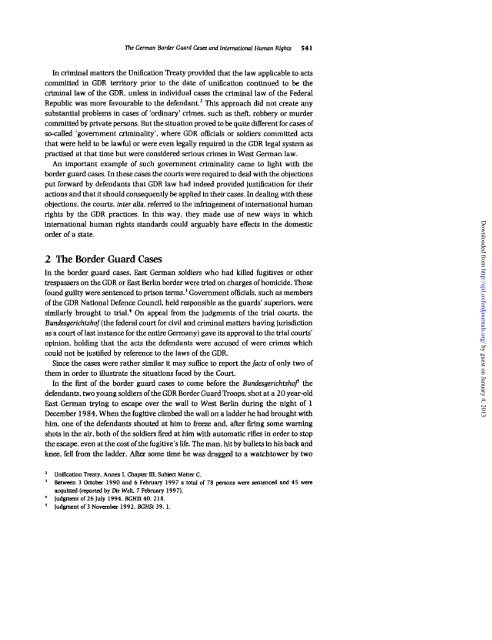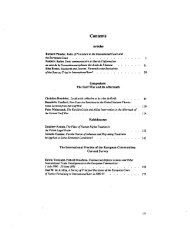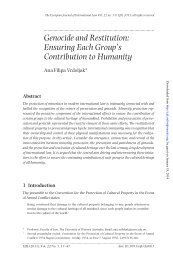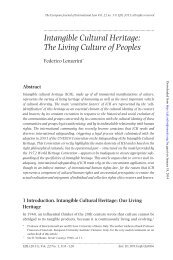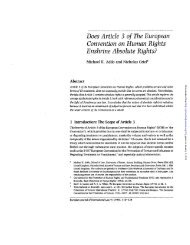The German Border Guard Cases and International Human Rights
The German Border Guard Cases and International Human Rights
The German Border Guard Cases and International Human Rights
Create successful ePaper yourself
Turn your PDF publications into a flip-book with our unique Google optimized e-Paper software.
<strong>The</strong> <strong>German</strong> Bonier <strong>Guard</strong> <strong>Cases</strong> <strong>and</strong> <strong>International</strong> <strong>Human</strong> <strong>Rights</strong> 541<br />
In criminal matters the Unification Treaty provided that the law applicable to acts<br />
committed in GDR territory prior to the date of unification continued to be the<br />
criminal law of the GDR, unless in individual cases the criminal law of the Federal<br />
Republic was more favourable to the defendant 2 This approach did not create any<br />
substantial problems in cases of 'ordinary' crimes, such as theft, robbery or murder<br />
committed by private persons. But the situation proved to be quite different for cases of<br />
so-called 'government criminality', where GDR officials or soldiers committed acts<br />
that were held to be lawful or were even legally required in the GDR legal system as<br />
practised at that time but were considered serious crimes in West <strong>German</strong> law.<br />
An important example of such government criminality came to light with the<br />
border guard cases. In these cases the courts were required to deal with the objections<br />
put forward by defendants that GDR law had indeed provided justification for their<br />
actions <strong>and</strong> that it should consequently be applied in their cases. In dealing with these<br />
objections, the courts, inter alia, referred to the infringement of international human<br />
rights by the GDR practices. In this way, they made use of new ways in which<br />
international human rights st<strong>and</strong>ards could arguably have effects in the domestic<br />
order of a state.<br />
2 <strong>The</strong> <strong>Border</strong> <strong>Guard</strong> <strong>Cases</strong><br />
In the border guard cases, East <strong>German</strong> soldiers who had killed fugitives or other<br />
trespassers on the GDR or East Berlin border were tried on charges of homicide. Those<br />
found guilty were sentenced to prison terms. 5 Government officials, such as members<br />
of the GDR National Defence Council, held responsible as the guards' superiors, were<br />
similarly brought to trial. 4 On appeal from the judgments of the trial courts, the<br />
Bundesgerichtshof (the federal court for civil <strong>and</strong> criminal matters having jurisdiction<br />
as a court of last instance for the entire <strong>German</strong>y) gave its approval to the trial courts'<br />
opinion, holding that the acts the defendants were accused of were crimes which<br />
could not be justified by reference to the laws of the GDR.<br />
Since the cases were rather similar It may suffice to report the facts of only two of<br />
them in order to illustrate the situations faced by the Court<br />
In the first of the border guard cases to come before the Bundesgerichtshof the<br />
defendants, two young soldiers of the GDR <strong>Border</strong> <strong>Guard</strong> Troops, shot at a 20 year-old<br />
East <strong>German</strong> trying to escape over the wall to West Berlin during the night of 1<br />
December 1984. When the fugitive climbed the wall on a ladder he had brought with<br />
him, one of the defendants shouted at him to freeze <strong>and</strong>, after firing some warning<br />
shots in the air, both of the soldiers fired at him with automatic rifles in order to stop<br />
the escape, even at the cost of the fugitive's life. <strong>The</strong> man, hit by bullets In his back <strong>and</strong><br />
knee, fell from the ladder. After some time he was dragged to a watchtower by two<br />
1 Unification Treaty. Annex L Chapter m. Subject Matter C<br />
' Between 3 October 1990 <strong>and</strong> 6 February 1997 a total of 78 persons were sentenced <strong>and</strong> 45 were<br />
acquitted (reported by Die WclL 7 February 1997).<br />
4 Judgment or 26 July 1994, BGHS 40. 218.<br />
' Judgment of 3 November 1992. BGHSl 39, 1.<br />
Downloaded from<br />
http://ejil.oxfordjournals.org/<br />
by guest on January 4, 2013


